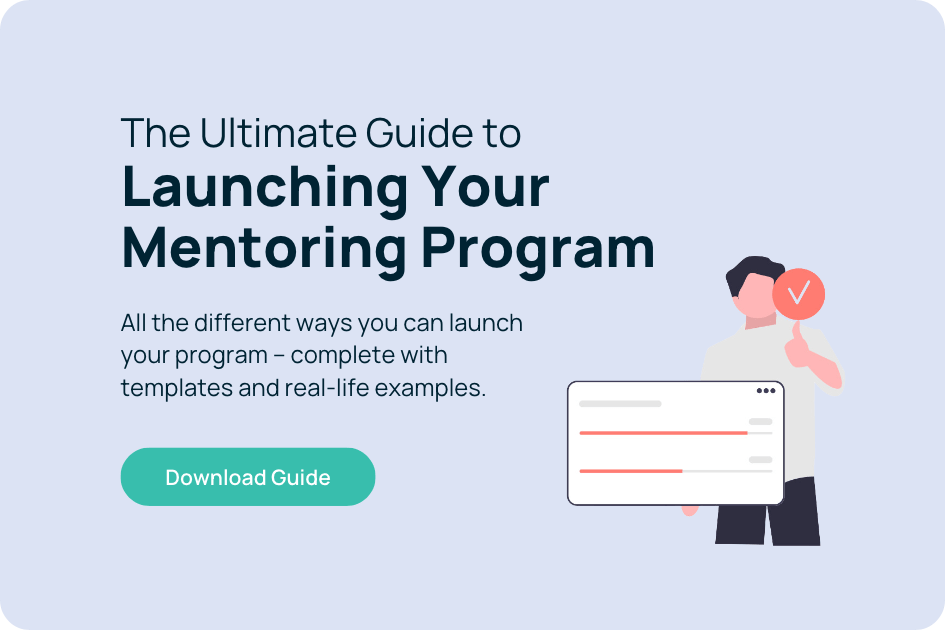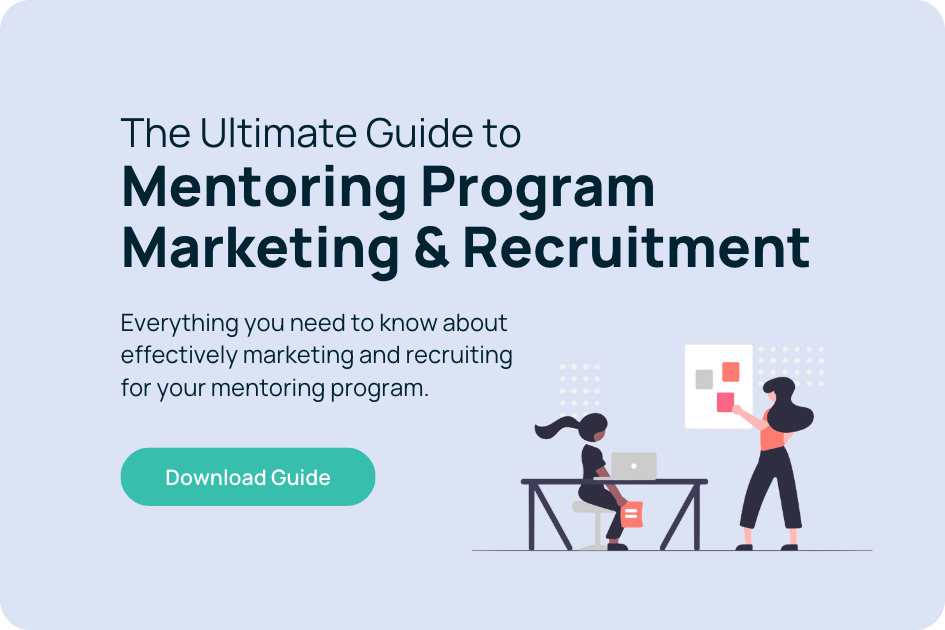Over the past quarter, the hot topic I’ve constantly heard about is how people are planning their 2024 people strategy around the 70/20/10 model, with a focus on agile professional development initiatives to address the ‘20’ that prompts them to reach out to us at Mentorloop.
The 70/20/10 model is a widely recognized framework for learning and development in the workplace. It suggests that learning and development occur through a combination of three types of learning experiences – experiential learning, social learning, and formal learning. So let’s talk about this model.
The 70%: Experiential Learning
It’s no secret that hands-on experience is where the bulk of learning in workplaces occurs and this model emphasizes the importance of it. Challenging assignments and learning opportunities in day-to-day activities play the biggest role in shaping an individual’s professional growth.
That’s because experiential learning provides a fertile ground for employees to apply theoretical knowledge to real-world situations which leads to a deeper understanding of their roles. Whether through on-the-job experiences, projects, or stretch assignments, this model emphasizes that the majority of learning occurs in the midst of practical challenges and opportunities that are relevant to a person’s role and career.
The 70% dedicated in this model to experiential learning acknowledges the transformative power of learning by doing, highlighting its pivotal role in shaping competent and adaptable professionals within the ever-evolving landscape of the modern workplace.
The 20%: Social Learning
Social learning encompasses activities such as mentoring, coaching, and collaborative projects. We all know that individuals learn significantly through shared experiences and insights from their peers and mentors and through different learning styles and this part of the 70/20/10 model recognizes that.
The 20% allocation to social learning emphasizes the profound impact of interactions and collaborations with others in the learning and development journey. It underscores the importance of building networks, seeking feedback, and engaging in constructive dialogue within a professional community.
Knowledge is not created in isolation; rather, it thrives in the collective wisdom and experiences exchanged among individuals. This social dimension encourages a culture of continuous learning, where the richness of diverse perspectives enhances individual growth and contributes to the collective intelligence of the organization.
The 10%: Formal Learning
Surprise! The 70/20/10 model designates just 10% of the learning process to formal learning – things like structured training programs, workshops, and educational courses. However, while this portion may seem small, it is by no means insignificant.
Formal learning provides the foundational knowledge, theories, and best practices that serve as the framework for professional development. This structured approach is valuable for introducing new concepts, skills, and industry standards to individuals.
Whether through classroom training, online courses, or seminars, the 10% allocated to formal learning complements the experiential and social aspects of the model, ensuring that employees have a well-rounded and comprehensive understanding of their roles. It acts as the anchor that connects practical experiences with theoretical foundations, creating a synergistic learning environment that maximizes individual and organizational growth.
However, while formal learning has its place, the 70/20/10 model suggests that it should constitute a smaller proportion of overall learning experiences.
The 70/20/10 model is not a strict rule but rather a guideline to emphasize the importance of a holistic approach to learning and development. It suggests that a well-rounded learning strategy should include a balance of experiential learning, social learning, and formal learning opportunities.
Investing in Agile Professional Development
The 70/20/10 model aligns with the trend of more informal and agile approaches to professional development and learning in today’s dynamic work environments. This is something that your L&D strategy should consider, especially when it comes to getting the most out of your L&D budget. An understanding of the 70/20/10 model gives you a framework with which to frame your strategic budget allocation.
A key takeaway from this model is that while formal learning, constituting 10% of the model, is undoubtedly crucial for laying the groundwork, the real transformative potential lies in the 70% dedicated to experiential learning and the 20% dedicated to social learning. That alone tells you where most of your budget should go.
Prioritising the highest-impact areas should be at the top of the L&D agenda and budget. Investing in experiential learning initiatives, such as immersive on-the-job experiences, challenging projects, and opportunities for skill application, allows employees to actively engage with their roles and apply theoretical knowledge to real-world scenarios. Similarly, channelling resources into social learning activities, like mentorship programs and collaborative projects, cultivates a culture of shared insights, peer-to-peer learning, and a vibrant exchange of ideas. By prioritizing the high-impact areas of experiential and social learning, organizations can maximize the effectiveness of their L&D budget, fostering a dynamic, adaptive, and engaged workforce.
This strategic approach using the 70/20/10 model aligns with the evolving nature of the modern workplace. In a business environment, where adaptability and collaboration are paramount, investments in experiential and social learning directly contribute to the agility and innovation of the workforce – it just makes sense. As organizations increasingly acknowledge the importance of continuous learning, directing resources toward the 70 and 20 components ensures that employees not only acquire knowledge but also develop the practical skills, interpersonal capabilities, and adaptability necessary for sustained success in their roles.
Mentoring and Its Role In Agile Professional Development
When we think about initiatives that can help organizations deliver on the ‘20’ and support the ‘70’ in that model, mentoring is always top of mind for leaders. It plays a pivotal role in fostering agile professional development by allowing for quick knowledge transfer, skill development, and problem-solving while also satisfying the desire of your people to feel more connected to their peers and supported by their organization.
Mentoring provides a structured platform for social learning – really levelling up that 20% of your L&D. Beyond enabling mentees to benefit from the experiences and insights of their mentors, this one-on-one interaction facilitates a dynamic exchange of knowledge and expertise, aligning with the collaborative spirit of agile professional development. The mentor-mentee relationship, often rooted in open communication and shared learning goals, becomes a catalyst for adapting to changing work landscapes and industry trends.
And the benefits don’t stop there. Beyond its place in the ‘20’, mentoring also seamlessly supports the 70% dedicated to experiential learning. As your people tackle challenges, projects, and day-to-day tasks, they do so with the guidance and support of a mentoring partner. This allows them to engage in this hands-on, practical dimension of the learning process with the benefit of another person’s insights and support, making it an even more effective exercise.
Mentoring programs also create an environment that not only encourages calculated risk-taking and innovation as your people go through their day-to-day experiential learning challenges but also ensures that the practical experiences contribute directly to the individual’s skill set on top of the benefits for the organization.
In essence, mentoring becomes a linchpin in agile professional development, harmonizing with both the social and experiential learning components of the 70/20/10 model. It fosters a culture of continuous learning, adaptability, and collaborative problem-solving, making it an indispensable tool in your L&D strategy, and the most cost-effective one at that.
Barriers to Getting Mentoring Started
But even with all that being well-established, we still see a few things that consistently get in the way of starting a mentoring program. It’s obviously a big deal to start an initiative like this in an organization, so we understand that there can be many questions and concerns in the beginning. How do we get started? How do we ensure mentor quality? How do we make sure this thing won’t fizzle out?
These are partly driven by people concerned about quality control and also worrying about being overwhelmed by managing too many people in a program – valid fears! However, these often lead to organizations making counterproductive decisions like placing too many restrictions or rules around who can join.
Setting up in this way stifles the success of the program because by restricting access to it, they in turn reduce the match quality because they don’t have a big enough talent pool. Not to mention, they’ve also spent the same amount of effort in the setup and launch of the program for 50 people which would be the same for 500!
The truth of the matter is that without a platform like Mentorloop, as you start, grow, and scale your program, the complexities around matching and quality only increase.
The good news is that the team here at Mentorloop have spent the last 18 months developing a product that now makes it easier than ever for anyone to start a quality and impactful mentoring program that doesn’t break your L&D budget, allowing you to offer it as an employee benefit to all!
Mentorloop Pro
We designed Mentorloop Pro to facilitate and streamline mentoring programs within organizations, making it easier for mentors and mentees to connect, collaborate, and track their progress. We’ve taken our extensive knowledge of building and running programs for some of the largest companies in the world and packaged that into a platform that allows anyone to start, manage, and scale a mentoring program.
At Mentorloop, we truly believe in making mentoring more accessible for more people. The development of Mentorloop Pro was an extension of this mission, allowing us to empower more people to start and run their own mentor programs in a simple and cost-effective way.
So how does it work?
Mentorloop Pro will take you through a 3 step process where you will be given the building blocks to design and customize your own program. The whole process will take you less than 15 minutes to complete! So let’s go through it.
Program Theme
In terms of setting up a mentorship program to promote social learning in your organization or community, my recommendation would be to select the Mentorloop Classic program theme. It focuses on understanding what specific soft or technical skills people want to develop or share their expertise in and uses those goals and skills to help people find a great quality match.
Matching Type
My next tip would be to use a Blended Matching approach. This allows you to empower your people to find their own matches while still having the ability to extend some help to those who need a bit more support. This also allows you to take full advantage of Mentorloop’s Recommended Matches – a feature that gives you and your people curated match suggestions using our Smart Match algorithm. This blended approach puts the power in the participants’ hands while also ensuring quality matches based on data. This methodology aligns with supporting a self-directed approach and fulfilling your ‘20’.
Launch
Now you’ve built your program, it’s time to launch! We’ve got a full guide to launching your mentoring program, as well as a guide for marketing it and recruiting participants which you can download for free.


You can also use our Media Kit to help you along. In it, you’ll find a heap of useful templates that will make launching, marketing, and recruitment super easy.
My Top Tip: Remember that mentoring doesn’t need to be hierarchical. Sometimes the best matches come from those who are just a little bit ahead of us. If we widen our definition of what mentoring looks like, it makes it more accessible and more impactful to more people. So the more people you can invite, the better quality program you will have. More people = better matches = better outcomes. Our Sentiments feedback tool will help you report on this, so there’s no need to worry!
Review and Measure
Using Mentorloop’s Live Program Coordinator Dashboard, you’ll be able to quickly ascertain the success of your program and anything that may need your attention. Participant feedback through Highlights will provide you with magic moments while also arming you with impact statements to help validate the success of your program and promote the program to the next cohort.
Need to dive deeper? Mentorloop’s Reporting and Analytics tools will give you exactly what you need to evaluate the health of your program and guidance on how to address issues as they come up – all in beautiful formats that are ready to go on your reports.
Continuous Improvement
It’s extremely rare that an organization has a dedicated Mentoring Program Coordinator. The responsibilities of running a program are always tacked on to someone else’s job and often it’s a thankless job. But at Mentorloop, we recognize and celebrate the amazing work of our Program Coordinators and ensure they feel supported throughout their journey from apprentice to master!
Not sure what else you should be doing? Join our PC Community where you can learn and be inspired by other PCs. We’ll also have monthly bite-sized training sessions so you can continue to optimize your program with Mentorloop.
Why I’m excited about Mentorloop Pro
As a co-founder of Mentorloop, I’m lucky enough to come to work each day and enjoy what I do. Everyone likes mentoring – it’s an inherently good thing!
We know from having run thousands of programs that no one mentor program is the same. The launch of Mentorloop Pro truly realizes a dream of ours that anyone, anywhere can start the mentor program they want to run.
Whether you are an HR manager, a Head of Department, a DE&I Manager, or a volunteer, Mentorloop Pro is the perfect tool to run an initiative that will support your efforts to champion the 70/20/10 agile professional development model with a mentoring program your people will love.




